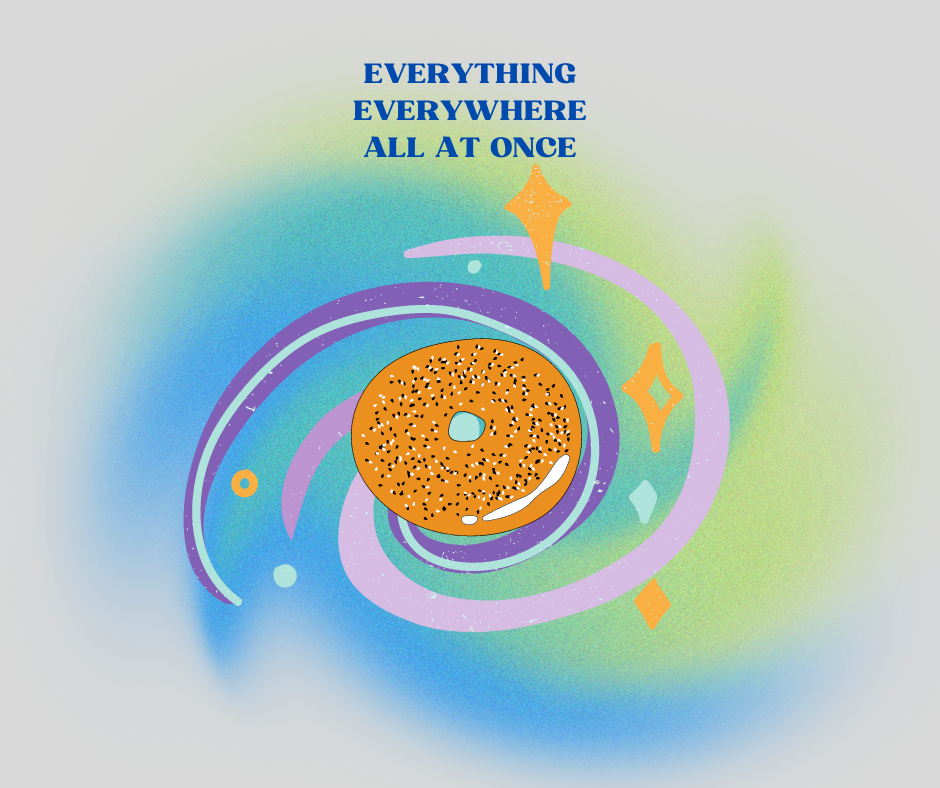Please visit response.fsu.edu for official FSU updates and resources.
Everything, Everywhere, All at Once: A Bizarre, Absurdist Triumph
 When I first walked out of the theater after watching Everything, Everywhere, All at Once, the first sentence I said to my mother was: “What the f&%$?” Caught up in the sheer chaos of the movie’s plot, my mother and I both failed to appreciate the movie’s deeper hidden messages and themes until about twenty minutes after leaving the theater, when she asked me what the movie even meant. At that point, I started to look back on the film’s significant moments and recurring themes: those of family, kindness, and an underlying subversion of the immigrant story - all amounting to an ultimate theme of appreciating our loved ones, even when they drive us up the wall. Despite my initial confusion (or the fact I still can’t get the movie’s long-winded name right), I definitely grew to appreciate the film’s absurdist, but well-constructed, plot and characters. I now understand its 96% fresh rating on Rotten Tomatoes.
When I first walked out of the theater after watching Everything, Everywhere, All at Once, the first sentence I said to my mother was: “What the f&%$?” Caught up in the sheer chaos of the movie’s plot, my mother and I both failed to appreciate the movie’s deeper hidden messages and themes until about twenty minutes after leaving the theater, when she asked me what the movie even meant. At that point, I started to look back on the film’s significant moments and recurring themes: those of family, kindness, and an underlying subversion of the immigrant story - all amounting to an ultimate theme of appreciating our loved ones, even when they drive us up the wall. Despite my initial confusion (or the fact I still can’t get the movie’s long-winded name right), I definitely grew to appreciate the film’s absurdist, but well-constructed, plot and characters. I now understand its 96% fresh rating on Rotten Tomatoes.
So, if you didn’t like the Everything, Anywhere - wait no - Everything, Everywhere, All at Once, here’s why you should:
(As with most film analyses, there will be some spoilers. I’ll try not to reveal too much about the plot for those who still haven’t seen it. But still, tread forward with caution, my fellow movie-goers.)
From Rotten Tomatoes, the movie’s description is :
“When an interdimensional rupture unravels reality, an unlikely hero must channel her newfound powers to fight bizarre and bewildering dangers from the multiverse as the fate of the world hangs in the balance”.
Anything, Everywhere - nope - Everything, All the Time - uhm - Everything, Everywhere, All at Once - aha! - centers itself around the multiverse theory, however the main message of the movie really centers itself around mother (and laundromat owner) Evelyn Wang (Michelle Yeoh), her husband Waymond (Ke Huy Quan), and her daughter Joy (Stephanie Hsu). Although the film’s “what if” type plot spirals out with each passing minute, each overtly ridiculous sequence still feels somewhat grounded. Thanks to the amazing performances of the cast, the theme of family shines through each odd moment, with segments of the film paying close attention to developing the experiences and emotions of each individual in the family and their relation to one another.
The significance of these dynamics reveals itself to be the heart of the film, most importantly, the role Waymond plays in the family dynamic. In many ways, Waymond becomes the true hero of the story. As the perspectives of both Evelyn and Joy begin to deteriorate and become more and more dismal, Waymond is the only one who manages to ground the mental turbulence of his wife and daughter. Through the evolving circumstances Evelyn and Joy face, Waymond remains a supportive constant who emphasizes compromise and kindness above all else. This seed of wisdom is what allows Evelyn and Joy to eventually overcome their turmoil, instead choosing radical acceptance and empathy for others to find peace with their place in the universe. Evelyn’s initial view that tenderness makes Waymond weak transforms into an appreciation for the strength, patience, and selflessness it takes to be truly kind.
Although Joy has been struggling with her own existentialism longer, Evelyn is actually the one to first notice and appreciate Waymond’s benevolent perspective. Joy doesn’t have the chance to realize just how significant selflessness is in all the universes because she has no example to look to; with her main role model for most of her life, Evelyn, being weighed down by the guilt, shame, and fear of disappointment that has been passed down from her family (mostly her father). With this realization comes the theme of transgenerational inheritance, or the idea that one’s behaviors and traits (good and bad) can be traced through previous generations of individuals. In this way, unhealthy parenting practices like the ones Evelyn exhibits with her daughter can be passed down, creating a cycle of guilt, shame and unhealthy parent-child dynamics that lead to a fear of disappointment. This can be seen in the way Evelyn looks so much for her father’s approval, even hiding the fact that her daughter has a girlfriend in order to not disappoint him, claiming something along the lines of “it’s a different generation, he could never understand”. This action not only invalidates her daughter’s sexuality, but provides a poor role model for Joy. The effects of cyclical guilt and shame can be seen in Joy, as she feels like she is a disappointment, or will never be good enough to appease her mother. This cycle isn’t broken until the end of the film, showing that these passed-down parenting practices can be altered for the better, and with positive results, too.
Multiverse theory can really throw you through an abysmal loop, making you question your place in the world and wonder whether your insignificant existence even matters. This movie does not seek to provide all of the answers to our existence. Instead, it appeals to the audience member on a subjective level, suggesting that while answers on a grander scheme may never be found, we can at least find meaning in our subjective experiences through appreciating the ones we love and all the complex dynamics, struggles, and triumphs accompanying those relationships. There is comfort in knowing our experience of confusion is at least a shared one. The film makes a point to highlight and subvert the line “nothing matters”. While the original meaning would imply a sense of hopelessness to our existence, what the film means to say with its definition is nothing matters - except the things we choose to care about. Moreover, the film even addresses the counterargument: even if nothing truly did matter, why not choose to be kind and appreciate the ones you love?
Along with great messaging, I would also like to note the way that the movie confronts and subverts Asian American stereotypes. In an article for the Washington Post, author Anne Anlin Cheng writes:
“The Daniels draw from a long history of Asians in America and notable Asian American issues, from the Wang family’s laundromat (recalling the long, exclusionary history of Chinese immigrant labor) to the Western romance with kung fu mysticism to the ‘model minority’ myth to the figure of the tiger mother. The film invokes, individualizes, multiplies, takes apart and then wackily reassembles these enduring tropes. The protagonist, Evelyn Wang (Michelle Yeoh), pushes back with a vengeance against the narrative paucity of the same old stories we tell about Asian American lives…
It’s not only that the multiverse acts as a metaphor for the immigrant Asian American experience, or a convenient parable for the dislocations and personality splits suffered by hyphenated (that is, ‘Asian-American’) citizens. It also becomes a rather heady vehicle for confronting and negotiating Asian-pessimism…
‘Everything Everywhere’ is about trying to figure out a response to an onslaught of hate, vengeance, resentment and persecution…Being able to parse and command all these worlds and modes seems a basic requirement for Asian American survival. It is both despite and because all of this that we are able to say to our loved ones and to our country: I still prefer to be here with you.”
This subversion of stereotypes allows for a different reading of the immigrant story, that as incredibly difficult, demeaning, and frustrating existing in an unwelcoming country is, all parts of ourselves: the “foreign”, the “American”, the “in-between,” still deserve a space exist within us all at once (hence choosing to exist as ourselves fully without that pressure to fracture into multiple personas). As a second-generation American myself, I took from the film that despite the trauma, the hate, and blatant discrimination experienced by us and our ancestors, we can still choose to move forward. Moreover, as immigrants and children of immigrants, our patchwork identities allow for a more diverse, complex perspective that can be an advantage to us if we allow ourselves to see it as such.
Outlandish, inventive, and playful - Everything, Everywhere, All at Once - Aha! I finally got it right! - hits every mark. While the many confusing layers of the film allow room for many interpretations, perhaps that’s a sign of a truly good film. Regardless of whether the movie (or its outstanding lead actress, Michelle Yeoh) wins an Oscar, one thing is for sure: this ridiculously bizarre and quirky film gave me insight into my identity, experience, and place in the universe - and I'm grateful for that.
Written by: Mia Hernandez
Art by: Solymar Estrella



